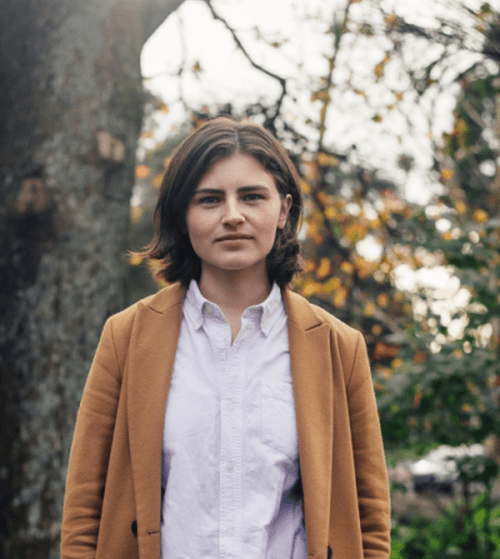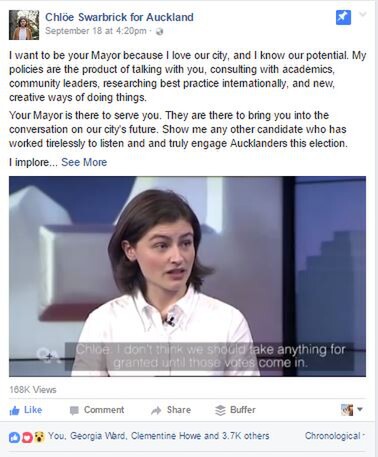By Brooke Hurndell
Chloe Swarbrick and the power of social media:
Like Malakai Fekitoa, Auckland mayoralty candidate Chloe Swarbrick is full throttle on the gas pedal coming down the centre of these local body elections and it's clear to see why. She knows her audience, she is great at showing that she cares about her publics and she has one almighty social media presence. Not to mention she is a frontrunner in being somewhat successful in engaging the 'unengageables' – a category predominantly made up of millennials.
She's a great example of a campaign that is using the power of social media to get the people of Auckland talking.
Getting more bang for your buck
Chloe Swarbrick by no means falls into the category of a 'throw as much money as possible at an election campaign' category. In fact, her approach is quite the opposite.
With a budget of less than $500, Swarbrick doesn't boast the luxury of fancy flyers, boisterous billboards or television ads. Besides the few posters she was generously donated, her campaign barely resembles those of traditional local body elections which we are usually accustomed to.
When we compare Swarbrick to mayoral candidates such as Vic Crone, it's clear the latter has a pretty sweet vantage point. The most recent Spinoff article suggests Crone's campaign's spending will reach $500,000 when it comes to an end – a few more zeros there than Swarbrick's. And let's not forget Phil Goff who's reported to have raised $250,000 in just one evening.
Cast your mind back to January and there would have been very few who would have heard the name Chloe Swarbrick.
So how has she shimmied her way into household discussions, news headlines and political debate?
Nowadays, social media is usually a given when marketing any product, service or electoral campaign. But its power is often underestimated when it comes to the potential reach of a Facebook page or Twitter account.
In fact, Chloe goes so far as to say her campaign would be virtually non-existent without it.
Chloe Swarbrick: "I definitely couldn't have run this campaign even ten years ago, because what Facebook and Twitter in particular allow you to do is reach those people you never would have been able to reach. It's also relieved the pressure people put on mainstream media, but it has resulted in me getting mainstream media as well."
Until a month ago, Swarbrick's campaign was dubbed as "not serious enough" to warrant traditional media coverage. She was hardly seen as a realistic candidate and struggled to shake the "just a 22-year-old" label that is velcroed to her back.
With such a strong online presence, mainstream media has had no choice but to pay attention.
The reason for which can be supported by the 2015 Global Social Journalism Study which highlights some useful stats:
With a Facebook page that has over 12,000 likes and posts which commonly gain 3,000 likes, it's not hard to see why.
Like Malakai Fekitoa, Auckland mayoralty candidate Chloe Swarbrick is full throttle on the gas pedal coming down the centre of these local body elections and it's clear to see why. She knows her audience, she is great at showing that she cares about her publics and she has one almighty social media presence. Not to mention she is a frontrunner in being somewhat successful in engaging the 'unengageables' – a category predominantly made up of millennials.
She's a great example of a campaign that is using the power of social media to get the people of Auckland talking.
Getting more bang for your buck
Chloe Swarbrick by no means falls into the category of a 'throw as much money as possible at an election campaign' category. In fact, her approach is quite the opposite.
With a budget of less than $500, Swarbrick doesn't boast the luxury of fancy flyers, boisterous billboards or television ads. Besides the few posters she was generously donated, her campaign barely resembles those of traditional local body elections which we are usually accustomed to.
When we compare Swarbrick to mayoral candidates such as Vic Crone, it's clear the latter has a pretty sweet vantage point. The most recent Spinoff article suggests Crone's campaign's spending will reach $500,000 when it comes to an end – a few more zeros there than Swarbrick's. And let's not forget Phil Goff who's reported to have raised $250,000 in just one evening.
Cast your mind back to January and there would have been very few who would have heard the name Chloe Swarbrick.
So how has she shimmied her way into household discussions, news headlines and political debate?
Nowadays, social media is usually a given when marketing any product, service or electoral campaign. But its power is often underestimated when it comes to the potential reach of a Facebook page or Twitter account.
In fact, Chloe goes so far as to say her campaign would be virtually non-existent without it.
Chloe Swarbrick: "I definitely couldn't have run this campaign even ten years ago, because what Facebook and Twitter in particular allow you to do is reach those people you never would have been able to reach. It's also relieved the pressure people put on mainstream media, but it has resulted in me getting mainstream media as well."
Until a month ago, Swarbrick's campaign was dubbed as "not serious enough" to warrant traditional media coverage. She was hardly seen as a realistic candidate and struggled to shake the "just a 22-year-old" label that is velcroed to her back.
With such a strong online presence, mainstream media has had no choice but to pay attention.
The reason for which can be supported by the 2015 Global Social Journalism Study which highlights some useful stats:
- Social media is integral to journalistic practices, with the majority of respondents (94%) using it on a daily basis
- 67% of journalists spend up to two hours per day on social media, a significant gain from the 38% who did the same in 2012.
With a Facebook page that has over 12,000 likes and posts which commonly gain 3,000 likes, it's not hard to see why.
The rise of Swarbrick
With this research in mind, the results speak volumes for social media's value. In Chloe Swarbrick's case, she has come from behind the pack to be named in the top four candidates of Auckland's local body election according to the most recent poll. She trails Phil Goff, Vic Crone and John Palino who certainly have a few more years under their belt.
Nevertheless, Phil Goff himself has come out saying if he weren't running for mayor he'd be voting for Swarbrick.
What is so compelling about her Facebook and Twitter?
Content that is thought-provoking, authentic and a political stance that appears to be very transparent. She also captures every opportunity to engage with her key publics.
"I respond to those almost right away … and in terms of Facebook I'm doing one post a day, I don't see the point in spamming people. I see the point in creating content that's worthwhile that people can engage with," she says.
What makes her campaign so riveting to the Joe Bloggs of Auckland, is the fact that she admits she doesn't have all the answers but she's a voice very different from your usual candidate. She uses her social media channels to tell her story and presents a very clear message to her audience. Perhaps it's her sense of authenticity that is turning heads.
Whether or not she comes out on top, she has undoubtedly challenged the status quo of elections. The role social media has played in the success of her campaign is significant and has evidently been integral to her ability to communicate with her audience. While it may not have captured the hearts and minds of all the non-Facebook and Twitter users out there (do they even still exist?), at a minimum perhaps this is just what Auckland needed to get young voters to put pen to paper and have their say in local body elections.
With this research in mind, the results speak volumes for social media's value. In Chloe Swarbrick's case, she has come from behind the pack to be named in the top four candidates of Auckland's local body election according to the most recent poll. She trails Phil Goff, Vic Crone and John Palino who certainly have a few more years under their belt.
Nevertheless, Phil Goff himself has come out saying if he weren't running for mayor he'd be voting for Swarbrick.
What is so compelling about her Facebook and Twitter?
Content that is thought-provoking, authentic and a political stance that appears to be very transparent. She also captures every opportunity to engage with her key publics.
"I respond to those almost right away … and in terms of Facebook I'm doing one post a day, I don't see the point in spamming people. I see the point in creating content that's worthwhile that people can engage with," she says.
What makes her campaign so riveting to the Joe Bloggs of Auckland, is the fact that she admits she doesn't have all the answers but she's a voice very different from your usual candidate. She uses her social media channels to tell her story and presents a very clear message to her audience. Perhaps it's her sense of authenticity that is turning heads.
Whether or not she comes out on top, she has undoubtedly challenged the status quo of elections. The role social media has played in the success of her campaign is significant and has evidently been integral to her ability to communicate with her audience. While it may not have captured the hearts and minds of all the non-Facebook and Twitter users out there (do they even still exist?), at a minimum perhaps this is just what Auckland needed to get young voters to put pen to paper and have their say in local body elections.


